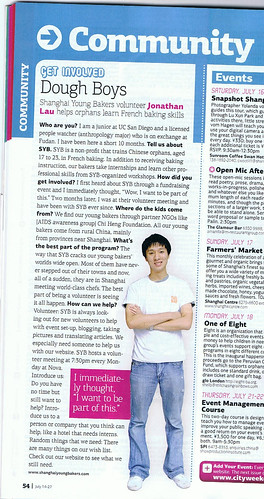Wednesday, December 28, 2011
Lunch with Hackers & Founders
Monday, November 14, 2011
My Networking Story
Hey – this just came out. Big kudos to Jonathan for helping!
http://www.slideshare.net/bowei/the-china-startup-report-a-15min-crash-course-by-bowei-gai
-H
It was a link to a presentation on the startup scene in China and on the “Special Thanks” slide was my name.
| Is that really my name there? |
Looking at this slide with my name tagged with 500 Startups, I am amazed by how far I have come. To think that while still in college, I would have meaningful professional connections that could help someone. It just leaves me speechless.
Just a year ago, I could not drop a name to save my life. There were no relationships with professors or even high school teachers to speak of. Only when I needed a letter of recommendation to study abroad did I have my first real conversation with a professor and that relationship died as soon as he wrote that letter.
My first attempt at real networking was during my political internship in Los Angeles. The internship coordinator pushed my intern class to go forth and network any chance we got. The plan was for me to collect as many cards as I could while being as memorable as possible and then email the card givers the next day telling them how much I enjoyed meeting them. For my efforts that summer, I ended up with a large collection of business cards, but only one of those cards ever ended up in a meaningful conversation. Something just was not working.
While studying abroad in Shanghai, I made no effort to network because I believed that it would be meaningless since I would be gone in a year. I started going to networking events for the drink specials and guest speakers, making no effort to schmooze anyone into giving me their business card. Surprisingly, during my stay in Shanghai I made significantly more connections than at any other point in my life.
Thinking back, I realize there were two reasons for the explosion in connections. First, by not having networking be the end goal of meeting someone, my interactions upon meeting people for the first time became much more genuine. I cracked jokes, talked about my personal life and was just generally much more relaxed. This helped people warm up to me quickly, allowing for a connection to happen organically. Second, I got involved in a non-profit and Toastmasters. Through these two organizations, people would not only see more and more of my personality meeting after meeting, but also see the kind of skills I brought to the table through the work I did for the organization. Cementing everything together was the understanding that we were all working towards a common goal, which made the relationships extra meaningful and more resilient.
In short, if you want to make meaningful connections, skip the networking events and cocktail parties. Just keep it real and get involved.
Monday, November 7, 2011
Study Abroad Advice for China

Pudong, Shanghai built in just the last 20 years
From September 2010 to July 2011, I studied abroad in Shanghai (SH) at Fudan University. I experienced a very different China from my classmates and the experience opened up my eyes and radically changed my perception of the country and culture. Recently, I was asked about my experience by a prospective study abroad student who was planning on going to China. The advice I gave her did not seem to do my experience justice so I was compelled to finish this post that has been on draft for weeks.
This is what I would tell every American student looking to study abroad in China:
Breadth vs. depth
Early on you will have to decide what kind of experience you want from China. The amount of time you have is severely limited meaning that you will have to decide between breadth or depth. China is a large country with many sights to see and at the same time is an incredibly complex society with many layers. It is a zero sum game in that seeing sights will mean understanding fewer layers and vice versa.
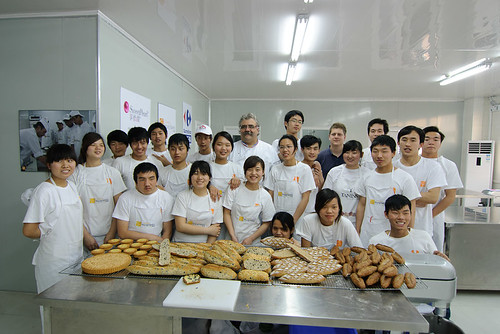
The class of Shanghai Young Bakers with French master chef Pascal Tepper
After backpacking for a week, I realized I was not much of a backpacker and opted to spend the large majority of my time in SH. I got involved in a nonprofit called Shanghai Young Bakers, as well as joining a local Toastmasters chapter. A lot of my time was spent exploring and trying to understand different parts of the city. I got off the tourist path and started acting like a resident, attending expat networking events, non-profit fundraisers, gallery openings. I even became a recognized regular at a café!

Sometimes, the art was in some strange places like this former opium storage facility

Other times, it just got creepy
This all came at a cost, as I skipped out on many of the things people expect you to see while you are in China, like the Great Wall, Forbidden Palace, and terracotta warriors just to name a few. I certainly saw the least tourist attractions out of all my classmates, but I do not regret it as I was able to see a China that was not in the tourist books. For instance, as part of Shanghai Young Bakers I was able to travel through AIDS impacted rural China and hear the stories of working class people my own age.
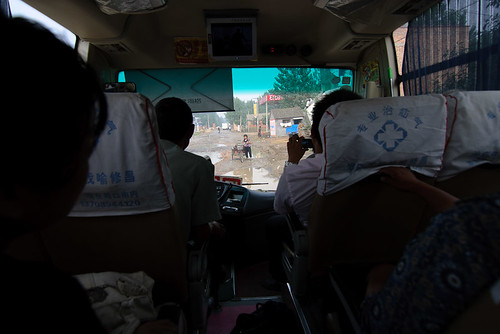
In rural China, sometimes getting off the beaten path means not much of a path at all
Learning Chinese
Not understanding Chinese, does not mean that you cannot get off the beaten path. First tier cities, like Beijing and Shanghai have large expat populations that will allow non-Chinese speakers to do unique and non-touristy things, such as partake in the local art scene. However, not understanding Chinese does severely limit your interactions and understanding of the locals.
Learning Chinese is an extremely time consuming process that will cut into your time exploring and experiencing the country. My advice for learning Chinese is to skip the university classes, which are largely impractical and instead hire one of the many student tutors. Also focus solely on learning to speak and pin yin, as these will immediately y improve your ability to interact with locals and get around the country. Armed with a smartphone or iPod touch loaded with Chinese-English apps and a rudimentary understanding of Chinese, you will be able to survive 80% of your day to day interactions. For the other 20% just guess and hope for the best, it is more fun that way anyway.
Do things alone
The truth is that no matter how many friends you may have, there will be many instances where due to school, work or just general disinterest, they will not be accompanying you to what you want to do. Many times, I found myself at an event or wandering alone in SH, and though it definitely would have been more fun with some company, I never regretted it. Do not wait upon others to do what you want, or else you will miss out on a lot. Also, one plus of going alone is that it opens you up to making new and unexpected friends.
Hang with non-Americans
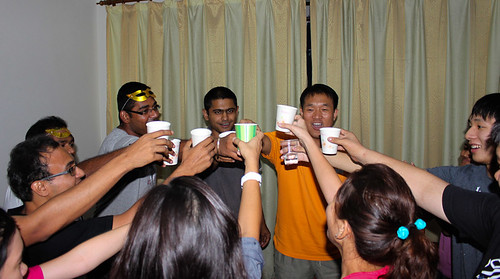
Nationalities represented at my birthday party: American, Canadian, Chinese, French, Indian, Korean, Singaporean and Thai
Arriving in a foreign land like China where you do not understand the language, the immediate impulse is to attach yourself with the familiar. I saw this happen with my classmates who mainly hung out with each other in large groups. This did not make much sense to me because I had not traveled thousands of miles to interact with more Californians. Due to my insistence on minimizing the amount of time I spent with Americans, I spent my first semester with a very international group of MBA students and then later with Singaporean exchange students. The most valuable thing I walked away with after a year in China was not the experiences or knowledge, but the friends I made that came from all across Asia.
Friday, October 21, 2011
My advice for your first day: Don’t be a robot
 This post has been on draft for a while and
recently, I have been inspired to complete it after being asked by a friend for
a ride to an interview. For many, the
beginning of school is marked by first time jobs and most people including me
were incredibly nervous and unsure about how to act on our first day.
This post has been on draft for a while and
recently, I have been inspired to complete it after being asked by a friend for
a ride to an interview. For many, the
beginning of school is marked by first time jobs and most people including me
were incredibly nervous and unsure about how to act on our first day. - Dress appropriately
- Arrive early
- Ask Questions
- Do your homework on the company
- Be positive/upbeat/have a good attitude
Monday, October 17, 2011
Marketing Binder Entry #4: Campus Crusade for Christ Booklet
 |
| Long, tacky title with an uninspired font and color scheme. And that's just the beginning! See the whole booklet here |
Below are two pages from the booklet:
There are a host of problems with them, but the most notable are:
- Lack of color - I imagine CCC is already paying for color printing due to the yellow, so why not use other colors to spruce up the text and make things pop? Also images in black and white in this day and age of cheap color printing is a crime.
- Text heavy/bad formatting - Shorter headers and bullet points would have helped the reader grasp the message more quickly. Overly repetitious headers, pushes the reader to gloss over the material. The last paragraph should have been broken up into bullets not only for the reader, but for the presenter of the booklet as well. Bullets in the form of incomplete sentences force the presenter to put things in their own words, making the whole presentation much more interesting and lively. Reading a sales pitch in front of someone is a surefire way to lose a sale.
- Confusing image - There are too many elements in the image to grasp at a glance. It fails to convey to the reader immediately how they are missing out on happiness due to the lack of Christ.
- Fails to answer "So What?" - The text fails to make immediately clear what is the benefit for receiving Christ. Reading through the headers and quotes the reader is left asking so what? The value proposition is simply not there.
Closing thoughts
Monday, October 3, 2011
Daily deal folly at UCSD or just a genius marketing ploy?
Wednesday, September 28, 2011
My first time on a panel: Arsalyn Youth Forum
| The young audience |
| The distinguished panel |
Monday, September 19, 2011
Bootstrapping Business Trip
One of our lunch groups was trying to expand out into cities around the country. The expansion did not go smoothly and had stalled at this time. Los Angeles and San Diego were two of the cities that were part of the expansion, so I decided to schedule meetings with the local organizers and see how we could get the ball rolling once again.
My first stop was in San Diego, where I sat down for a cup of coffee with one of the writers of the Lean Customer Development books. He was quite frank about the weakness of our value proposition and in no uncertain terms told me to go work on it immediately. Just telling people networking was good was just not cutting it, I really had to spell out the benefits of these lunches.
Moving forward, the SD organizer advised I set up lunches preemptively and then invite people to the event rather than waiting for the group to reach a critical mass. He explained that people would be more willing to join a lunch group if there was a set lunch to look forward. As for promotion, he suggested I craft boilerplate (pre-crafted) emails to organizers to send to their members that clearly illustrated our value proposition. Then with these emails do an A-B test by sending one email to a half of the group and another to the other half in order to determine what language was the most successful. The key to making these lunches happen was to create a turnkey for the organizers, making the lunch recruiting process as effortless as possible. At the end of our meeting, he invited me to come back and attend his weekly coffee meet up so I could talk to the group members and tease out what would get them to attend a Wednesdays lunch. Needless to say, I left that cafe thoroughly enlightened.
The next day, I was back on the road and in LA meeting with another organizer. I managed to clear up some miscommunications about the level of involvement for the organizer and ended up getting him on board for the next lunch. It turns out that the LA group only met about once a month and these were usually speaker events. The organizer thought that his members would be interested in bimonthly casual lunches as it would help with networking and community building. After this meeting the attitude of the organizer went from I am too busy/not interested to let us give it a try. What a lesson on the power of in person meetings.
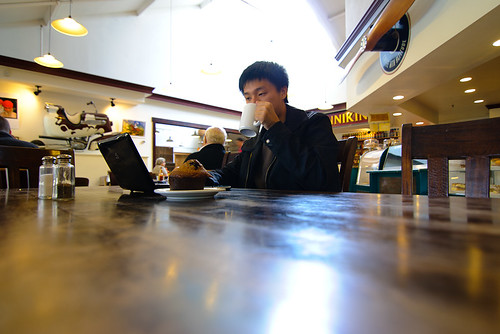
Coffee's for Customer Development
Back in San Diego, I attended the coffee meetup that the SD organizer hosted, where I met Dave, a member of the group who suddenly made the value of lunch very clear. Dave explained that the entrepreneur by nature is isolated because he has to act as if his startup is doing great and problem free to the outside world. Dave envisioned Wednesdays lunches as a support group for entrepreneurs, a place where they could openly and safely talk about the problems they were having with people who have been there and done that. When I heard that, I thought it sounded like a pretty good tagline for entrepreneurial themed lunches.
While talking to Dave and the other group members, it dawned on me that this was no different from the anthropological field work that I was used to doing. I was utilizing the same interview and observation skills that I had honed out in the field, doing academic research. Customer development suddenly seemed to be just applied ethnology and the idea of being one’s own customer was nothing more than participant observation.
The day before my trip started, Startup Weekend (SW) cleared me to go to their LA event and my trip got extended to a whole week. That is how I ended my trip in beautiful Santa Monica, handing out flyers around SW. Not too exciting but it had to be done. There is no insight like the one you get from being on the ground with customers and I relearned that while handing out flyers to people who kept asking me what a lunch club was. The founders and I had always thought that the term "lunch club" was self-explanatory, but after interacting with the SW attendees, I realized that was not the case. So next time on the back of the flyers there will be definitely be an explanation. My trip ended on a high note as I was invited to the front of the stage by the CEO of SW and allowed to pitch the lunch group to all the participants. I could not have imagined a better way to end the trip.
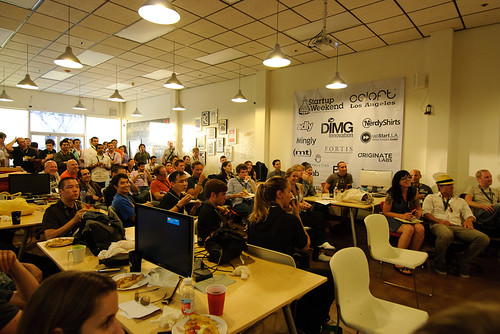
Ending on a high note at LASW
Friday, September 2, 2011
My PR stunt that never was
Monday, August 29, 2011
Food Startups Demo Day at 500 startups
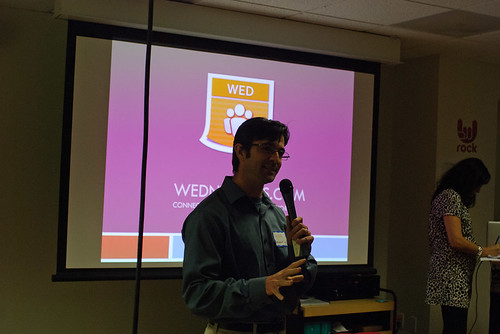
Wednesdays.com demoing
Two weeks ago, Wednesdays.com participated in a Food Startups Demo Day at the 500 Startups office. I was able to tag along as the intern and watch the many panels and demos that occurred at the over three hour event. This was my first demo day in the states and I was positively blown away by the quality difference compared to Techyizu in Shanghai.
Panels and Personalities
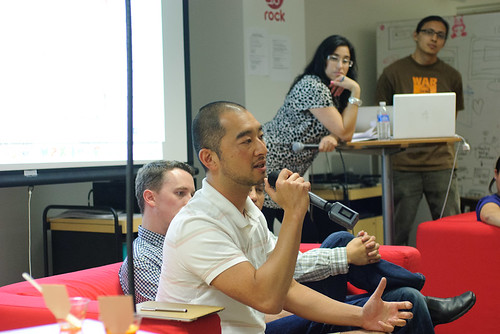
Aki Sano, Founder of Cookpad.com
The event featured panels and personalities that were quite informative, though a little boring at times. In attendance was Aki Sano, the founder of Cookpad, which is the most popular cooking website in Japan boasting a 50% percent penetration rate among middle aged women, was in attendance. Sano provided many cool sound bites, one blasting social gaming as useless and another comparing growing a startup to building a bioweapon. Besides sound bites, however, Sano sadly did not add much value even though the crowd, including me, was dying to know how he managed to grow Cookpad to what it is today.
Notable Startups
Of course, this was a demo day so let us talk about the startups as well.
Three startups stood out:
Smart Gardener

A gorgeous looking social network for gardeners centered around helping gardeners connect over gardening! Smart Gardener had tools that appealed to both new and experienced gardeners such as a planning tool that helped users layout their new garden and an automated journal where users can add in pictures and notes. By far the most impressive aspect were the social tools that allowed users to connect with other users who were growing same crops or in the same climate. This way, users could exchange gardening information that was relevant to them, eliminating the noise of Google searches. After the demo, I walked away thinking that if I ever were to start gardening, I absolutely needed to be on Smart Gardener.
Culture Kitchen
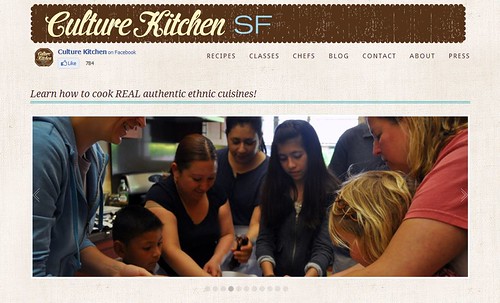
Culture Kitchen served some amazing Thai curry made by an immigrant grandmother for their demo. And that is pretty much their whole idea in a nutshell. Culture Kitchen hosts cooking ethnic classes taught by immigrant women. It is a novel idea and I can see myself attending their classes, but it does not seem scalable. I would imagine that there are huge difficulties in finding these immigrant women, especially the “grandmothers” that Culture Kitchen was touting in their presentation, given that they are most likely not online nor listed in some sort of directory. I can see Culture Kitchen being a successful niche cooking school in San Francisco, where they could scrape local community centers, churches, etc. for teachers but I cannot see it scaling to much beyond that.
Spoondate
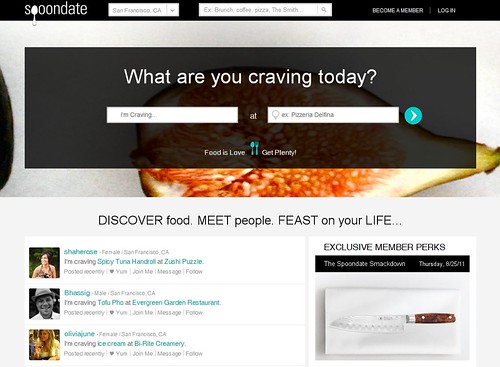
There is an interesting backstory to this startup as my founders told me that they sat right next to them during Wednesdays.com’s time in the 500 Startups accelerator program. At the time Spoondate was a dating site for foodies, but they have since pivoted away from that. Or at least that was the story I was told, Spoondate was introduced as a dating site before the founder got up on stage and clarified that it was not. However, many aspects of the site made it seem like a dating site and even in the demo, the founder used dates as the reason for why people would use the site.
The basic premise behind the site is that you type in a food that you are craving and a restaurant you are craving it at. This information gets deposited into a running feed on the site which other users can see and they can choose to join you to get what you crave. It is an interesting concept and I could see myself using it when I am traveling and have no idea or body to eat with. However, I think I would be too afraid of ending up eating with someone creepy to actually carry through joining or posting a craving.
Random Take Aways
Everybody’s site or app was really good looking; it definitely put Wednesdays.com to shame. There was a strong emphasis design and the user experience, everything was sleek and the right things popped. The next day at office, all of us at Wednesdays knew we had to radically improve the look of our site. After consulting a designer, our redesigned site looks worlds apart from what we used have.
A live twitter feed of a unique hash tag for the event was displayed during downtimes at the event. This was something that I had never seen before and it was awesome, because it allowed for members of the audience and presenters to see what people around them were thinking about the event. I am definitely going to implement this at the Financial Horizons Conference, which I help organize through the student organization, the Undergraduate Investment Society.
Friday, August 26, 2011
"Best Photo From Your Internship" Contest - Internmatch.com
A Shoestring Budget Office
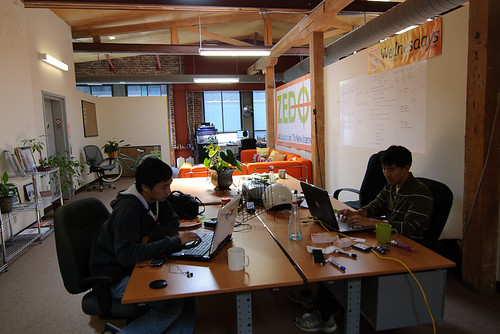
At Wednesdays.com what you see is what you get. On the first day of my internship, I was surprised to find that our whole office was just four tables pushed together, which we sublet from another startup. It never occurred to me in my wildest dreams that you could even do that! This office represents to me what a startup is all about, making due with what you have and building amazing products on a shoestring budget.
Three is Company
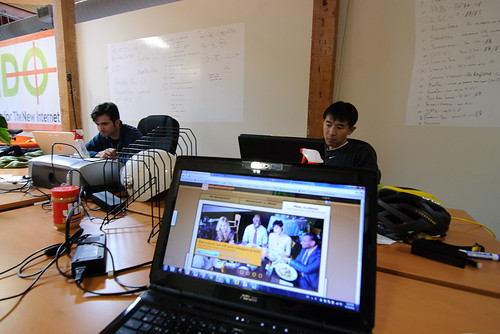
In a three person company, the work place is very intimate. I sit right across from my two founders/bosses/co-workers and as a result the atmosphere is very casual. Whenever, I have questions I just speak up at the table and ask. In addition, I get to see and partake in pretty much everything that happens in Wednesdays.com. In a close environment like this you have to love the people you work with and thankfully I do.
Coffee is my religion and Cafes are my church

Coffee is a vital part of my internship because without it there would be no way I would be able to make the one and a half hour commute to San Francisco and ACTUALLY work once I got to the office. When you rely on coffee as much as I do, there are some strange behaviors associated with it. For instance, every time the coffee pot is empty I curse under my breath whoever left it that way and when there is no more coffee in the office, I die a little inside as I make a cup of tea. Due to the fact that they serve coffee, cafes become the second office, conference room and home whenever we at Wednesdays are on the road or tired of our real office. My internship at Wednesdays has led me to ask where would startups be without coffee!?
Bootstrapping Business Trip
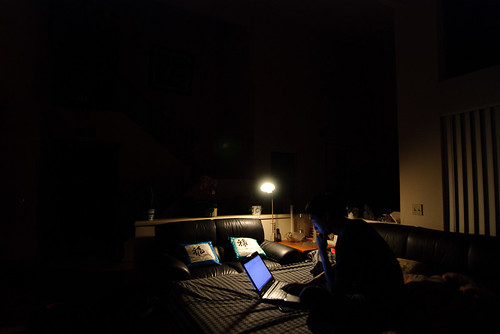
When you are an intern on a "business" trip at a startup, there's no corporate credit card that you charge your expenses to. Instead, you bootstrap it like the rest of your company, which means bumming off friends' couches or in this case air mattress. Nonetheless, it was a blast to meet current users and potential users. Getting out into the field was what I was taught in Anthropology and that is what I have found to be most effective for customer development during my time at Wednesdays.com.
Startups by the beach

As part of my week long "business" trip, I was able to attend Startup Weekend in beautiful Santa Monica. Wednesdays.com is partnering with Startup Weekend to create lunch groups for their alumni. As the Wednesdays.com representative, I was able to meet the CEO of Startup Weekend Marc Nager, and he even pulled me up in front of the crowd so that I could pitch the lunch club. This scene was definitely one of the high points of my internship experience and a perfect way to end my "business" trip.
Sunday, August 21, 2011
It’s the Flow Stupid!
In my last blog post I talked a little bit about SV legend Robert Scoble coming in and giving us feedback on the flow of Wednesdays’ group creation process. It was quite eye opening because I had never thought that there was thought behind something as basic as registering a group. This was a classic case of “devil in the details.”
Creating a group is a fairly simple process. You go through the steps and filling out the who, what, where, when and how fields in succession. However, according to Scoble, the secret sauce in getting people to get through all your fields lies in which order you present these questions. As users are inherently lazy and have a tendency to stick with what they know, they need to coaxed through the entire process. The biggest competitor is not another company or service rather the back button and the thought of business as usual. At all costs the user must be prevented from going “F--- this I am just going to send an email like last time.”
Scoble talked about “keeping the dream alive” and he gave us an example of a user's thought process setting up a lunch group. It went something along the lines of this:
Ok so I want to start a lunch club. Well what are we going to meet about? I do love and startups and want to meet other entrepreneurs! *names group Startup Lovers* Then who would I invite? Hugh and Andy definitely have to come *adds their emails*. Oh I am always free on Wednesdays let’s do lunch at noon on the first of every month. I cannot wait till next week!
By asking the who, what, when, why questions in the correct order, the dream of the lunch club is kept alive. The user is being walked through their desire and each step is not only logical but delightful as it helps the dream grow and brings it closer to life in the mind of the user.
It was a pretty cool lesson to round off my first week. I am going to ask my friend who majors in Cognitive Science to explain more about this as it seems applicable to all kinds of things. There is sure to be an Anthropological angle to this as culture shapes people’s thought processes.
Sunday, July 31, 2011
My First 10 days at Wednesdays
On my first day, just walking to the office was a joy, as there is this startup vibe in the SOMA area that just makes me smile. On the street, every other person is carrying latte and their style of dress ranges from geek casual to strictly professional. Walking to work, I hear people talking about startups and later at lunch I hear people talking about startups at the next table over. I have this feeling in SOMA that we all kind of do the same thing and with it comes a sense of belonging.

Beautiful SOMA
The action started as soon as I arrived at 215 2nd street (drop by!). I hit the ground running at Wednesdays and have not really stopped. My first day of work did not feel like a first day at all. I was getting asked for inputs on all sorts of things from the design of the site to the how to manage upcoming lunches. It felt like I was starting day 30 of my internship rather than one. I have never done an internship where I was so quickly thrown into the deep end.
My work at Wednesdays includes a little of everything, from managing customer relations, to graphic design, scheduling lunches and of course some administrative work. I feel like an essential part of the Wednesdays.com team. There is a strong feeling that my work directly affects the company and that if I dropped the ball at any time, there would be real consequences to the company. In short, I feel important at Wednesdays.
The feeling of importance is directly related to the size of Wednesdays. Imagine my surprise when I discovered that the entirety of the Wednesdays.com office was just four desks pushed together. Wednesdays sublets its tables from another startup and I believe that there are two other startups in the space that are doing the same thing. I thought I had worked at small organizations, but my stint at Wednesdays definitely raises the bar. The whole company currently only consists of me and the two founders, so every day I go to work and sit at one of the four desks, directly across from them.
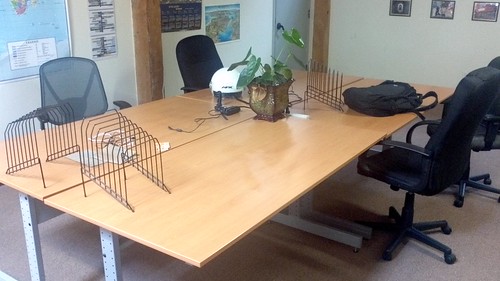
The Wednesdays office, ALL of it
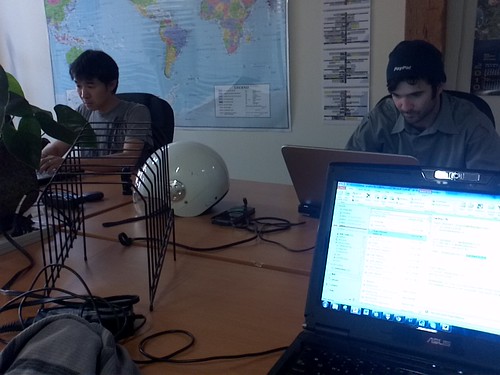
Us and our huge laptops, up close and personal
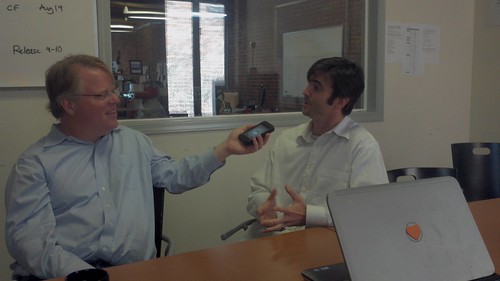
Robert Scoble, a living Silicon Valley legend, came and interviewed Hugh...
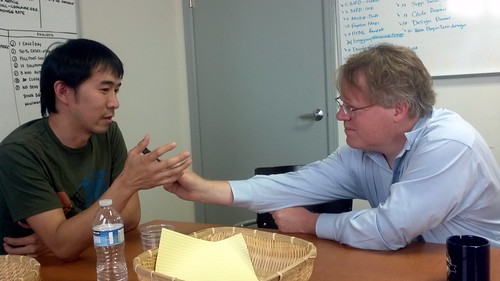
...and Andy on Friday.
If the group dynamics of three people could be called a corporate culture, then I would describe Wednesdays’ as incredibly open, relaxed and quintessentially geeky. Wednesdays is open because the founders answer all my questions about fundraising, themselves and customers without hesitation. Relaxed, because we all come to work wearing clothes that do not qualify as business-anything and shaving seems to be optional. Also, jokes abound in the office with most of them coming from Hugh and many times they are used to scare me into thinking I messed up. One day I will learn. As for geeky, for starters we lug our huge laptops, which are slightly more portable than desktops, to work daily. Then there are the founders themselves. Hugh once instructed me to “align margin left and align margin right” the white board and Andy shared how he had registered his daughter’s name as website the day she was born.
The only downside to this internship is that it requires me to wake up at 6:30AM and commute four hours a day. However, this is balanced out by the free coffee at the office, which I take more than full advantage of.
All is going well at my first tech internship, so well in fact that I am not minding the admin work at all and thinking about how to stay involved once my two months are up.
Tuesday, July 19, 2011
Thoughts on TechYizu
There were three startups that stood out to me for different reasons.
Rudy Bike
Rudy Bike has designed a chip that makes electric bikes more efficient, reliable and easily monitored. The chip is compatible with any brand of electric bike and easily installed, (plug and play). An Android phone was required to take full advantage of the chip, as it was paired with an app that would give the user the battery level as well as other features such as a turbo mode that would allow for the bike to go faster at the cost of more energy. They already have a working prototype.
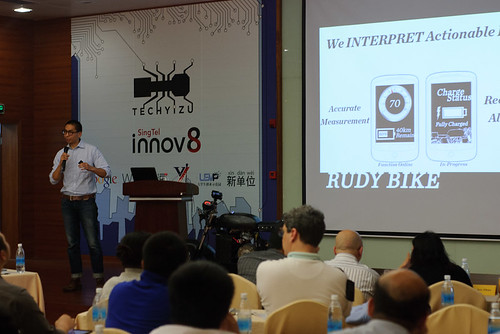
The reason that Rudy Bike stood out to me was not because it was a brilliant product, but rather due to its huge disconnect from its target market. Namely, that it is mainly the lower class in China that ride electric bikes. Rudy Bike quoted the price of its chip to be around 1000RMB, which as one judge on the panel pointed out is about how much a new electric bike cost. If doubling the cost of the bike was not enough, there was also the problem of requiring a smartphone in order to fully utilize the chip, probably adding on another 1000RMB if not more to the final price tag. It is hard to imagine that the typical Chinese electric bike rider would be willing or even capable of paying for a chip that would triple the price an electric bike.
Mamazuofan

Self-proclaimed “Airbnb of food,” Mamazuofan is connecting hungry people with home cooked meals near them. Users log on to the site and see what is cooking around them, then they order online go to the chef’s home and pick up their meal. Their site is currently live, though the majority of users are foreigners.
Mamazuofan’s concept was certainly the most unique at Techyizu, though I doubt the sustainability of it. After one transaction has been completed, the customer could very easily just grab the phone number of the chef and in the future cut Mamazuofan out of the process. In addition, the reason Airbnb works is because the renter of the room does not have to make much of an effort to rent out a room, the same cannot be said about a home cooked meal. I cannot see someone using Mamazuofan part time to supplement their income due to the thin margins and massive amount of prep time it takes to cook.
Ultratradr
The winner of demo day, Ultratradr is looking to disrupt the way banks and hedge funds recruit talent. Ultratradr is a game where players practice stock trading. The idea is that the best people in the game will get recruited by banks and hedge funds.
My concern with Ultratradr, is that banks and hedge funds already have a strong process of recruiting top tier talent from universities. In the US recruiters routinely visit schools and aspiring finance students rub elbows with executives at networking events. I am not sure that the industry is looking for disruption as the process seems to be working quite well. However, the founder did mention that they are targeting small to medium sized firms, so that could put a different spin on things.
Saturday, July 9, 2011
Marketing Binder Entry #3: Product Bundling in China

Haphazardly taped yogurt
It would make more sense to bundle products that complement each other, and if it causes consumers to use more of the product then all the better. An example of better bundling would be to bundle a flashlight or battery draining toy with the batteries. I would like to believe that it is all common sense.
The good news is that the amount of weird bundling has gone down since I came to China. Though after a little searching I still managed to find some Dove body wash bundled with Lipton tea.

After drinking tea, I too have a strong desire to take a shower

Thankfully during my time in China, sensible bundling has become the norm
More Pictures of Bundles
Monday, July 4, 2011
Wait… that’s racist!
At least their logo is politically correct
For those who are unfamiliar with the term, the word coolie is a racial slur directed at Asian laborers particularly Chinese (Wiki entry). The word has fallen out of use, but the racist history and connotation behind the slur is still widely known.
With a company name like that the founder can forget about doing business in the United States. In addition, the fact that a Singaporean government funded a company with such a name makes me think they are just throwing money at every startup that comes knocking.
Often times, we think of cultural insensitivity going West to East, but this is a perfect example of how cultural ignorance works both ways of the East-West divide. Though, I am extremely surprised this is the name of a Singaporean startup with a Singaporean Founder given that the coolie slur was used by the British in Singapore. Maybe everybody in the world is in need of some better history education?
Friday, July 1, 2011
UPDATE Chat with Dr. John Fung
Uncle John (aka Dr. John Fung from Hong Kong Council of Social Services) came swung by Shanghai over the week and he managed to find time in his busy schedule to have dinner with me. At dinner, he told me about the progress that his organization had made with the social ISP project as well as the political battle that occurred over it.
When I was in Hong Kong, a month ago I was told that the social ISP project was embroiled in some political scandal. The Government Chief Information Officer who was handling the awarding of the contracts for the social ISP project abruptly resigned and then published a letter stating that “On several occasions before, during and after the evaluation of proposals, it was made clear to me that there was a political requirement to select a particular implementer.” (Read more about the scandal here)
Besides the political scandal, however, the social ISP project was doing great. Uncle John told me about the great prices on service and computers the social ISP was receiving. It all seemed like things were going according to plan and people were getting helped.
Saturday, June 25, 2011
Update: Old School Mentality on Social Media
A lack of time is a perfectly legitimate reason not to dive into social media, because the only thing worse than no social media strategy is a half assed one. Facebook and twitter are littered with unused accounts that were started because everyone else was doing it. Once these businesses realized that some actual effort was needed to keep these accounts active, they quickly gave up on them. These dead accounts with posts that are months or even years old reflect badly on the businesses that manage them. With limited resources, social media would not be the first place I would invest in order to start building a web presence.
Aside from talking about social media, I was very impressed by the bakery owner’s talk about internships. If anybody is looking for an internship in Shanghai where you will not just get used and abused, I highly suggest seeking out this man out. What he will teach you in a span of a year, I have needed multiple years, jobs and internships to learn.
The only hint I will give for anybody trying to find him is that his shop in Lujiazui makes one hell of a cappuccino for 25RMB.
Thursday, June 9, 2011
Bad interviews: An interviewee’s perspective
I talked about my great interview with Wednesdays, so today let me share a dreadful interview experience.
Much has been written about bad interviews from the interviewer’s perspective, but in my opinion, the interviewee’s side of the story rarely gets told. A couple of months ago, I had an interview that was absolutely terrible and I would just like to share the experience.
I was interviewing for an internship position at a start up in Shanghai. Before the interview, I had talked to my professor, who told me that my interviewer was a “bright kid” and recent graduate from Berkeley. However, things started off on the wrong foot, when my interviewer arrived twenty five minutes late. He then proceeded to give one of the worst interviews I have ever had.
The interview started going downhill after a couple of minutes when I realized I was the only candidate and that this was not really an interview at all, but rather an introduction to the company. From the beginning it seemed that the interviewer was not quite sure what to ask me and was going to accept me so long as I did not exhibit any obvious problems.
When I asked my interviewer what I would be doing at my internship, his answer was vague at best. He explained that I would be doing marketing, but the details of what kind of marketing escaped him, though what was most concerning was the admission that the company had no marketing goals. From what my interviewer told me, I gathered that he wanted me to create the whole marketing strategy for the company which was not exactly something you ask an unpaid intern to do. At this point, I was having serious doubts about how successful this company was going to be.
In the middle of describing the internship, my interviewer uttered something along the lines of “a self-driven position where you get as much as you put in.” This phrase is the bane of my existence for any job description, because it loudly states that the employer has no idea what to do with me. In addition, it conjures up the idea that I will be running around the office making copies and getting coffee, where the only time I will be doing anything meaningful is when I discover it myself. At this point in the interview, the interviewer must have sensed my hesitance because he assured me that I would have support from the rest of the team and that they had “some” marketing ideas.
Towards the end of the interview, my interviewer told me that after consulting with his boss, the internship was no longer going to be paid. Shocked by this admission, I could not help but loudly exclaim my surprise at this job application blasphemy and it took a lot of self-control not to ask him why he was wasting my time. Lying about compensation in a job description is akin to me lying about my experience on my resume, it is the ultimate betrayal of trust in the job application process.
Needless to say I walked away from that interview with an extremely negative impression of that company.
Tuesday, May 31, 2011
Capitalizing on Young Professionals in China
It is no secret that Chinese culture centers around the family and this fact is taken full advantage of by advertisers who plaster images of happy families onto all sorts of advertisements for all kinds of products. Products are often marketed as something that brings families together or makes the whole family happy. However, there is a large group of Chinese, that are trying to get farther away from their families, not closer and most people are not seeing it. Did I also mention that they have spending power?
I am writing about the growing number of Chinese young professionals, who have tasted independence in university but are then forced to move back with their parents due to high housing prices. In addition, this group has a lot of disposable income due to the fact that they do not have to pay for housing and only support themselves. I first learned about this group of young independence seekers while talking to an MBA graduate at a nonprofit meeting. He told me that the best part of London, where he did his MBA, was not the culture, people or food but rather the independence he got from his parents. That is when I realized how important independence was for this new generation of Chinese. Slowly, I began to recall conversations that I had with Fudan students where they talked about how great it was to be living on their own in college and being able to make decisions independent of their parents.
Upon further contemplation, I realized that this want for independence should not be of any surprise to anyone. This current generation of young professionals in China consume American culture in large amounts. American music, movies and television series which strongly stress independence, especially from that of parents, are all incredibly popular with the university crowd in China. In addition, many of these young professionals have experienced life away from their parents in university and also traveled abroad to more independent oriented cultures. Therefore, it should be no surprise that China’s current crop of young professionals value independence from parents more than previous generations.
Though there is no product that a company can make that will give these young professionals the independence they want, short of housing, capitalizing on this want for independence is possible. Products and services that serve as escapes from parents, such as short vacation packages for them or their parents, should appeal to these young professionals trapped at home. Also any products or services that serve to make the parents more independent from the young professionals will be well received as well.
Corporations would do well to create or market products and services that satisfy this desire for independence among China’s new young professionals.
Monday, May 30, 2011
Old School Mentality of Social Media
On a sunny Sunday, my friend and I were invited out to a casual lunch by the owner of a famous bakery in Shanghai. The owner was exceptionally friendly, openly sharing his knowledge about networking and marketing.
For all of his great advice, what struck me the most was how the owner viewed social media. His my profile, my castle mentality meant that he wanted complete control over his social media presence, meaning that he would not tolerate any form of criticism. It was a mentality that struck me as decidedly old school and reminded me of the challenges that I faced trying to get the directors at UCTV to adopt social media. In addition, his “Why let people score on your own goal” attitude was keeping him from creating such simple things as a blog or Facebook page because it would be a huge time commitment to police.
In my opinion, social media is about opening dialogue and allowing for criticisms to be answered. Facebook pages, twitter and blogs can be used as new channels for customer service. The owner’s attitude towards social media ran counter to what I have heard about his attitude in the restaurant. My friend told me once that when she complained to him about her cake, he immediately took it back, found who was responsible for making it and then immediate corrected the mistake. This act of customer service gave her a great impression of the owner and bakery. There is no reason this kind of great customer service cannot be applied to say a Facebook page, where it would be available for all to see.
In my experience, there is often a reason for brand bashing and since the owner runs a restaurant which serves amazing cakes and has great customer service to boot, I think his concerns over negative comments are completely unfounded. Not to mention that unjustified criticisms will be dealt with by the bakery’s loyal fans, something which I have seen played out on countless Yelp pages. Fans fighting brand bashing is a phenomenon, which countless companies have discovered upon launching their social media operations.
As of right now, the bakery only has a presence on Chinese social media sites because they allow for more restrictions on user comments. About half of the bakery’s customers are foreigners meaning that whatever awesome outreach that the owner is doing on social media is only reaching half of its potential. In short, extending the bakery’s social media presence onto Western networks will improve customer service and increase customer-brand interaction as well as bring a host of other benefits that I cannot list out because it would make this blog post too long. Most importantly, all of these benefits can be realized without a significant increase in effort because it would just be a matter of translating and posting on an additional platform.
I am going to email the owner this blog post, and hope that he reconsiders his social media strategy. If he changes his mind, I will be the first to like the bakery's Facebook page.
Sunday, May 29, 2011
500 Interns Conclusion: I GOT HIRED
Crazy to think that in just two weeks I went from feeling completely hopeless about my summer internship situation to getting hired by Wednesdays. I must thank InternMatch.com for running such a neat little competition and also Nathan for making the necessary introductions to the startups I was interested in.
Most of all, I would like to thank Wednesdays’ founders Andy and Hugh for conducting such a model interview. It was the most tension free interview I have ever had, though I must admit that getting asked for my GPA outright early on in the interview caught me off guard. The two founders asked me questions that allowed me to demonstrate my knowledge of marketing, while skipping the dreaded “tell me about yourself” question. In addition, they were very clear about what I would be doing as an intern, putting to rest my fears of just being slave labor. Most impressive of all, was how transparent Hugh was about Wednesdays. He answered all of my questions head on during and after the interview, never once resorting to a gate keeping attitude I was expecting.
I walked away from that interview with a strong desire to work with Andy and Hugh. Needless to say I am very excited to be joining the team.

